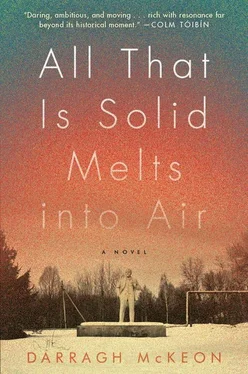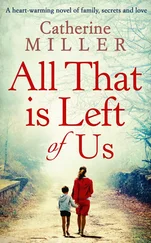On the first morning, on Monday, when he woke at four, the anticipation turning something inside him, he could think of nothing, but decided not to rise: his older sister, Sofya, slept six feet away and it would be wrong to wake her any earlier than necessary. Besides, his parents slept in the next room and his father would wake and dress and then be angry with him for adding another hour to his already long day. There was a possibility he would be denied the trip and would have to wait another year to shoot grouse with the men. One more year. He had pleaded with his father for so long now that another year would drain away the joy of anticipation, leave him murky and resentful.
And so, on that first morning, he simply lay in stillness and watched the rise and dip of the blankets that covered Sofya and the slow wash of light from a wakening sky, light that climbed the wooden walls and spilled across their neatly folded clothes resting on the two shelves of the opposite wall.
So curious, the colours he sees now, much different from the other mornings, seeping through the glass, making each aspect of the room seem precious, as though while sleeping they had been doused in wealth. His threadbare shirts seem gilded, the walls fashioned from a deep, exotic wood. He tries to think of a word with which to describe the sight to his mother when they sit over dinner this evening, but he doesn’t know the word yet. When she says it to him later, he forms it on his lips, repeating it silently, “luminous,” the shape of the word causing his lips to move like those of a feeding fish.
He thinks of his babushka who died during the winter. His father took the door off its hinges and laid it out on their table and laid her on top of it. A simple ritual that lifted the weight Artyom had felt during those days. Seeing her presented like that, the moment wasn’t as final as he’d expected it to be. Even though her skin had gained a greenish tinge, and her forehead was as cold as the stones they picked from the bare earth before ploughing. That night, when he took his turn to watch over the body, he spent his time staring at the candlelight dancing its way around the flaked paintwork on the boards, the gnarled iron of the latch. The light glowing then as it did now, softly vibrating around its edges.
When the hour hand finally nudges into position, Artyom rises and gathers his clothes and creeps into the kitchen. He pulls his pants over his underwear, laces his boots, drops some small logs into the stove, poking it back to life, and walks to the well outside.
Springtime. A freshness in the air. Everything growing, all around, everything feeling alive, blossoms and birdsong, all things paled in their coat of morning dew. He drops the bucket down and hauls it back up and cups the cold water under his armpits and over his chest, with its newly acquired trails of hair, and, leaning over the well, pours the rest of it around the back of his neck, so that it parts over his head then joins upon itself once more, falling back to its origin in one sinuous length.
He stands and wipes the water from his eyes, smearing it down his cheeks, and shakes out his head, the cold of the water charging through his skin.
He opens his eyes and the sky floods his retinas, a sky of the deepest crimson. It looks as if the earth’s crust has been turned inside out, as if molten lava hangs weightless over the land. The boy looks into the depth of the sky, looking further than he ever has before, seeing through to the contours of the universe.
Artyom can hear muffled conversation from the pathway and sees steam rising over the hedgerows. He moves back inside to the kitchen, where his father laces his boots. The boy covers himself with a shirt and rubs it against his body, so it soaks up the remaining drops of water clinging to his skin. He slides into a woolen sweater and wraps himself in a coat and hat and folds his hands into a pair of fingerless gloves.
“Wait until you see the sky,” he says to his father. “What a sky.”
“It’s the same sky we’ve always lived under. It’s just in a different mood.”
Artyom takes the large jug of milk from the fridge and pours it into two bottles, then seals and wraps them in wet rags before placing them in his satchel. His father hands him a box of cartridges and the shotgun, which he has already cracked open for safety, so that its two ends droop over his father’s arm as if winded. His father gives him a nod, which is a silent reminder of the safety practices they have discussed: keep the gun open unless loaded; keep the cartridges dry and in their box; never point a loaded gun anywhere but at the sky or the target.
They join the men in silence, footsteps crunching across the packed earth. He has known these men all his life, known them at times to be loud and funny and full of song, but on these mornings they pay respect to the repose of the land, smoking in unison, opening their mouths only for a quiet greeting or a suggested change of direction or when a bird is spotted.
The boy walks a little further back from the men, trailing the huddled bulk of the group. He likes to open and close the gun, enjoying the reassuring twock that comes from the closure of finely engineered metal. He pushes aside the clasp and opens the shaft and closes it again, the sound of something fitting as it should. He’s sure his father would look disapprovingly at such a habit and so he keeps his distance, keeps the pleasure his own.
They take the same route as other mornings, turning left past the Scherbak home, crossing a small stile over the drain, and heading into the fields towards the pond where the grouse will have returned once more, having forgotten the deadly lesson of the previous morning.
His father had taught him to shoot only two weeks beforehand. It was a Tuesday evening when he brought the extra gun home. The boy knew he had received it from one of the other men in the kolkhoz—the collective farm—in exchange for covering some extra shifts; which in turn compelled Artyom to treat the gun with a reverence; the fact that his father was willing to work for it, for him. His father brought it home but gave no indication of his efforts. To an outsider, it might have seemed that his father merely found the object sticking out from a hedgerow at the end of the lane, that it was simply an advantageous quirk which interrupted an otherwise unremarkable day.
Artyom knew differently, though.
His father showed him how to line up the sights of the gun, demonstrated for him the different stances required when kneeling or standing, and when the boy was finally allowed to take his first shot at a depressed football they had hung from a branch, he was astonished at the power of the kickback from the weapon, causing him almost to lose his balance; despite the fact that he had anticipated it, been warned of it, had lodged the butt of the gun firmly into the notch between his shoulder and his collarbone. The compressed power of a weapon. This was what it was to hold power in your arms.
Crossing the second field, Artyom changes his path slightly, walking in an arched trajectory so he can approach some of the scattered bullocks chewing lazily in the morning air. He likes to rub his hand along them, the quivering life they hold underneath their hairy exteriors passing itself into his fingers. He likes the packed concentration of muscle beneath the beasts. When he was younger, he and his friends would punch the cattle hard, hoping for a response, but they never managed to provoke anything more than a disinterested look.
Artyom runs his hand over the head of the nearest one and feels the morning dew slicking his fingers, the heat emanating from its neck. The dew feels different than on previous occasions, as though it has the texture of fine material, and the boy looks at his fingers and finds them tipped with liquid. He scans the body and sees a channel of blood slowly pouring from the animal’s ear, dripping to the grass below. He checks the next bullock, ten feet away, and finds precisely the same.
Читать дальше












